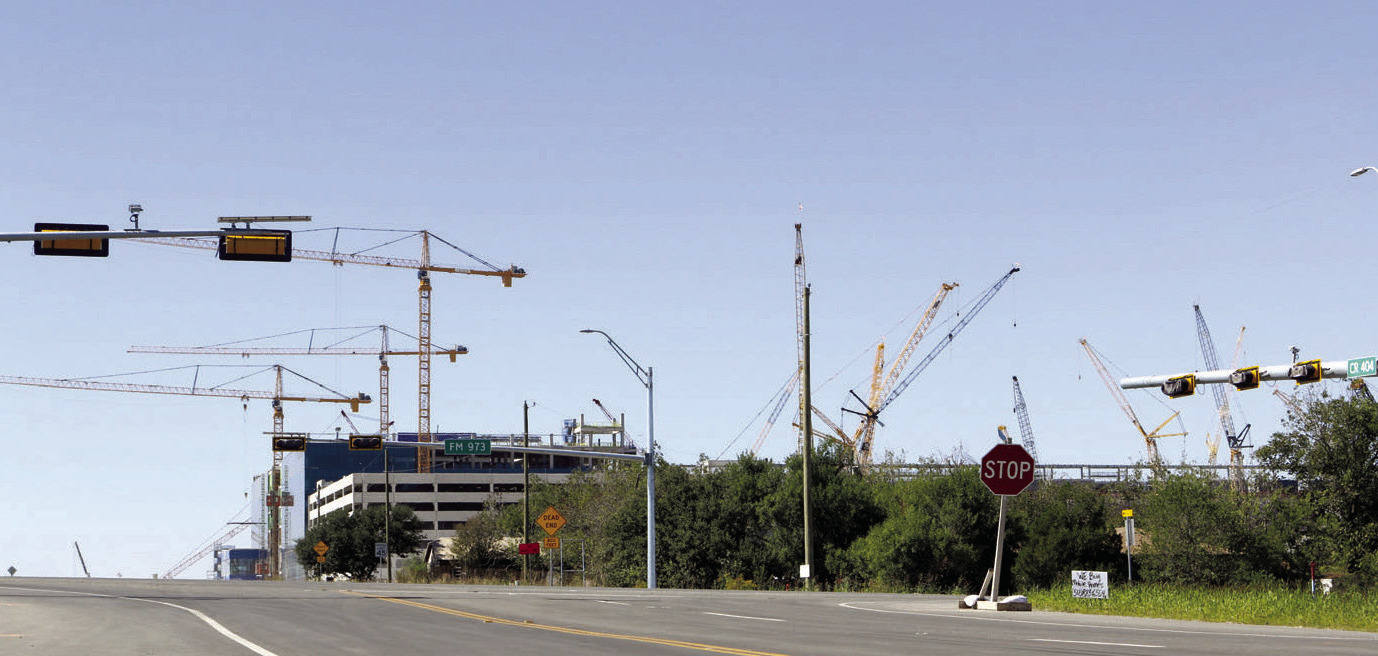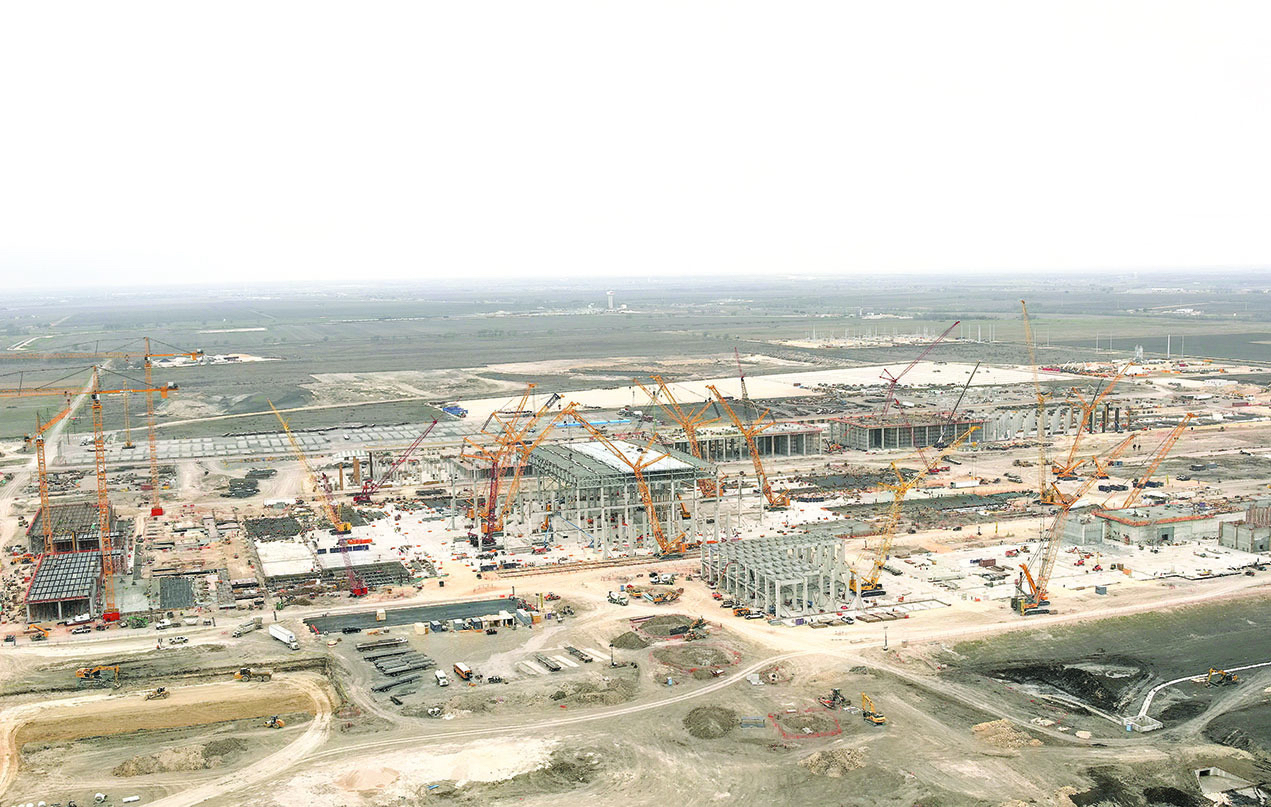TAYLOR — This once-sleepy town on the fringes of Austin could become one of the fastest growing cities in Texas, if not the nation, thanks to a $17 billion investment by Samsung Electronics Co. Ltd.
And as the South Korea-based company’s 6-million-square-foot microchip fabrication plant takes shape southwest of town, many are wondering what kind of cultural impact the 1,800 workers — many of them tasked with highly skilled jobs, some hailing from Asia — will have on the semi-rural town borne from the railroad and agribusiness.
Based on her experience with a plant established 25 minutes away in Manor 28 years ago, Michele Glaze, director of communications and community affairs for Samsung Austin Semiconductor, doesn’t think the feel of Taylor will change much at all.
Samsung Austin Semiconductor in Taylor will be operational by the end of 2024, but some published reports say it won’t be engaged in mass production until 2025.

“We hope to blend all our cultures, our Korean culture, our American culture and our Texan culture together,” Glaze said. “We have an internal saying that it’s the ‘bibimbap culture.’ Bibimbap is one of the most popular Korean foods and the beauty of this particular dish is that it takes multiple different ingredients, things you would never think go together.”
She added, “Mix it in a bowl, add an egg on top, mix it all together and it’s delicious. So, we look at that type of dish as representative of our own blending — we are a Korean-based company, we’re an American company, and because we are in Texas now, everything we do is about combining all three of those cultures.”
Though visitors to Starbucks aren’t surprised to see tables filled with young people wearing their Samsung nametags, many of them hailing from the West Coast or South Korea, officials said the majority of the workers currently at the site are temporary and engaged in construction.
They number about 8,000, said Jon Taylor, corporate vice president Samsung Austin Semiconductor, at a recent presentation in Round Rock.
“Most of the workers that are on the Taylor site today are transitional construction workers. The employee base won’t really be growing until 2025,” Glaze said. “Most of the people we employ are Americans, including Korean Americans, but during the construction phase, we have more expatriates, those folks coming from Korea to be here for a short time because they are experts in building a new facility.”
Samsung has agreed in talks with local governments and officials to “hire local, so our demographic will reflect the town’s demographic,” Glaze added.
For Samsung, the Taylor facility will offer the most advanced manufacturing and the most advanced technology in the company’s framework, representatives said. While the company is already accepting applications, hires should be prepared to float between both the Austin and Taylor campuses.
Employees and potential employees are looking forward to working at the fabrication plant, or fab, in the Blackland Prairie, officials said. Taylor beat London, New York, Arizona, South Korea and other prominent locations vying for the facility.
“We were looking for communities willing to collaborate with us and provide economic to building incentives, we were looking for a great workforce and talent, we were looking for reliable utilities, we were looking for strong educational backgrounds, and one of the beautiful things about Taylor was that they had 1,200 acres of flatland,” Glaze said.
Samsung’s selection of Taylor was announced in November 2021.
A benefit for the Taylor community is that Samsung likes to hire students directly from high school and train them. In August, the company completed an inaugural internship for about 24 students through a partnership with the Taylor Independent School District.
Samsung officials hope these students will apply to Samsung when they graduate.
“We are very excited to be part of the fabric of Taylor,” Glaze said. “We love its charming characteristics, and we are hoping to be a thread through the fabric of Taylor, and not be the fabric of Taylor.”
Tia Stone, who just celebrated her eighth anniversary as president of the Greater Taylor Chamber of Commerce, has been looking at the Samsung expansion and considering the best ways for local businesses to prepare for it.
“I’m looking at it from a community perspective and a business perspective. I want new people moving to my community to help us be richer, both culturally and financially. I need them to feel comfortable and welcome here,” she said.
She is engaging local businesses and residents, and has even reached out to the Greater Austin Asian Chamber of Commerce, to learn more about what the local chamber can do to make newcomers to Taylor feel welcome.
“This is not new for Taylor, but it is a renewal,” Stone said. “And it’s not about highways, but industry. We were built on industry, so it rhymes historically. This isn’t different from when we were founded. When the first industry came, we got the railroad. This time around, we’ll have Samsung Highway.”
And more jobs and opportunities are on the horizon.
“The Samsung job to contractor ratio is 3 or 4 to 1, so we’ll also have lateral businesses popping up as well,” she said.
Stone said she realizes change is hard, but without change, she said, there is no growth.
Wayne Mueller, owner of Louie Mueller Barbecue, a third-generation family business in Taylor, agrees.
“This is a town that hasn’t changed in about 100 years. At one time, Taylor was the largest inland hub for cotton, and much of the harvesting work was done by hand by immigrants,” Mueller said. “They would take their earnings and buy food for the encampments, and the town would get back into the black. In the (1960s), with mechanization, the money paid out to equipment rentals and purchases was never recycled back into the town, and we lost our identity.”
Mueller said Taylor went from being a small town and an agrarian community to becoming a high-tech hub.
“We sort of skipped the industrial revolution,” he said. “Change will be hard — the first piece of this is our real-estate taxes, which are going up thanks to supply and demand; the second is a dramatic increase in traffic.”
The influx of so many contract workers might make it seem like the town’s demographic is changing, but that’s only an illusion because once the plant is built, most of the builders will return home, officials said.
Adapting to the new growth will come with its own set of growing pains, and Mueller said it’s going to take hard work to catch up with the unprecedented growth. But he believes it will be worth it.
One concern for many is creating enough housing so new workers will live in Taylor, patronize local businesses and attend local schools.
“Sometimes I feel like an island, one of the few businesses left that has tethers to Taylor’s 20th century history,”Mueller said. “I welcome the change and I welcome the growth, but what I am going to miss is the community I grew up in.”
Indeed, Mueller said there is a small exodus of people who want to maintain the bucolic lifestyle they enjoyed in Taylor.
“But the more people we have coming through our town, making it their own, the better off our local businesses and residents will be,” he added. “When your number is called to go in the game, you have to be ready to play. Now that we are being called, it’s time to perform. It’s up to all of us, and to make this transition positive, we all have to work together.”
He added, “At the end of the day, trust is earned. This is like a marriage, and we want it to work.”




Comment
Comments